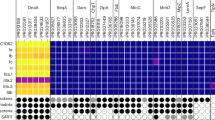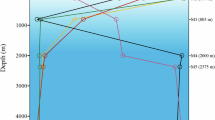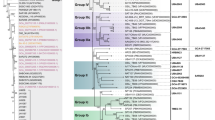Abstract
On the basis of 16S rRNA gene sequencing, the SAR11 clade of marine bacteria has almost universal distribution, being detected as abundant sequences in all marine provinces. Yet SAR11 sequences are rarely detected in fosmid libraries, suggesting that the widespread abundance may be an artefact of PCR cloning and that SAR 11 has a relatively low abundance. Here the relative abundance of SAR11 is explored in both a fosmid library and a metagenomic sequence data set from the same biological community taken from fjord surface water from Bergen, Norway. Pyrosequenced data and 16S clone data confirmed an 11-15% relative abundance of SAR11 within the community. In contrast not a single SAR11 fosmid was identified in a pooled shotgun sequenced data set of 100 fosmid clones. This under-representation was evidenced by comparative abundances of SAR11 sequences assessed by taxonomic annotation; functional metabolic profiling and fragment recruitment. Analysis revealed a similar under-representation of low-GC Flavobacteriaceae. We speculate that the fosmid bias may be due to DNA fragmentation during preparation due to the low GC content of SAR11 sequences and other underrepresented taxa. This study suggests that while fosmid libraries can be extremely useful, caution must be used when directly inferring community composition from metagenomic fosmid libraries.
Similar content being viewed by others
Article PDF
Author information
Authors and Affiliations
Corresponding author
Rights and permissions
About this article
Cite this article
Temperton, B., Oliver, A., Field, D. et al. Bias in culture-independent assessments of microbial biodiversity in the global ocean. Nat Prec (2009). https://doi.org/10.1038/npre.2009.2818.1
Received:
Accepted:
Published:
DOI: https://doi.org/10.1038/npre.2009.2818.1



